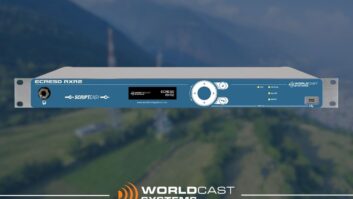
NPR faces a veritable army of LPTV supporters in its quest to rid the FM band of so-called “Franken FMs,” those low-power television stations operating as pseudo radio stations on 87.9 MHz. NPR wants the FCC to address the issue now rather than waiting for the elimination of analog LPTV service to solve it.
Comments to MB Docket 03-185 were due this week. The FCC sought comment on adopting a cut-off date by which all Class A, LPTV and TV translators must transition to digital operations sometime in 2012.
There was some support for an early date from Entravision as well as PBS, the American Association of Public Television Stations and CPB, but most of the broadcast comments are from LPTV operators asking for more time, saying that a 2012 transition from analog to digital operations is too soon.
NPR says the LPTV analog shutoff should happen as soon as possible and that the FCC should make clear that LPTVs operating on Channel 6 and providing a mostly FM radio service do not serve the public interest. NPR says “it is a gross waste of a public resource to use 6 MHz of radiofrequency spectrum to provide an ersatz FM radio service.” NPR writes that many of these “rogue FM radio stations” are causing harmful interference to licensed FMs.
NPR cited examples such as Venture Technologies Group, licensee of KSFV(LP), Los Angeles, which it says has leased the station to Hombre Nuevo, which uses the station to broadcast “Guadeloupe Radio 87.7 FM.” Similarly, Syncom Media Group, licensee of KXDP(LP), Denver, has leased the station to Front Range Sports Network, which uses the station to broadcast ‘87.7 The Ticket,’ according to NPR, which adds: “Neither of these operations make any pretense of providing a television service, and they are far from unique.”
NPR states: “The commission’s technical rules governing LPTV were designed for reception of the service by analog television receivers, not to permit an audio service comparable to those offered by FM radio stations and aimed for reception by FM radio receivers. To attempt compatibility with FM radio receivers, these ersatz FM radio stations tend to circumvent the technical rules governing stereo pilot tone frequency, audio modulation levels, aural carrier frequency and maximum aural power limits in an effort to extend the reach of the station’s audio signal and to be comparable to regular FM broadcasting. Furthermore, some LPTV stations are not even operating visual signals, in clear violation of the commission’s rules.”
The broadcaster credits the FCC with acting on some of the violations of its technical rules, but says the agency needs to enforce the rules vigorously, “particularly when an LPTV station is causing interference to adjacent NCE FM service.”
As you can imagine, the named LPTVs took exception to being called “rogue” FMs that cause harmful interference, and they shot back.
Venture Technologies Group, which operates Spanish “Guadeloupe Radio 87.7” KSFV(LP), Los Angeles and “87.7 Chicago’s Smooth Jazz” WLFM(LP), Chicago, stated NPR “hurled specious and misleading accusations” against Venture and LPTVs that operate on Channel 6. Venture sought to refute NPRs statements and reported that “there is nothing unseemly about a television station that broadcasts audio services.”
Venture opposes a hard transition date, arguing that, in some cases, “low-power analog operations are the most efficient, market-driven use of TV spectrum.” It’s unclear, it continued, whether any spectrum will be reserved for LPTV following implementation of spectrum givebacks and/or repacking to implement the national broadband plan. Until LPTV operators have information about their continued viability, it said, the commission should not impose a digital transition deadline.
WLFM(LP), Chicago, said it “provides an important public service” by operating on analog Channel 6, “to provide radio audiences with an additional aural service” and these kinds of LPTVs can provide niche programming in a crowded radio market like Chicago. WLFM points to an audience of “more than 600,000 weekly.” WLFM says such LPTV broadcasters should be able to choose between operating in analog or digital and urged the FCC not to set a hard transition deadline at all.
That’s similar to the position of Island Broadcasting Co., licensee of WNYZ(LP), New York, which says of its four total LP TV stations, WNYZ has remained analog because “it provides a vital programming service to minority, non-English-speaking audiences in New York City.” Island believes even a 2015 date is too soon.
Entravision supports an early 2012 analog cut-off and urged the FCC to adopt “specific measures to restrict LPDTV spectrum access to capable, committed broadcasters” while PBS, the Association of Public Television Stations and CPB support a Dec. 31, 2013 analog cut-off.
Nick Leggett, an early LPFM supporter who also supports the concept of low-power television, says most LPTV station viewers have modest incomes and live in poor areas in mountainous terrain not served well by high-power television or radio. Imposing a 2012 shutoff would impose a burden on these community LPTV stations and force many of them to shut down, he told the FCC. He supports a 2015 date.
Engineering consultancy Hatfield & Dawson says 2012 is too soon but agrees a hard digital conversion date is necessary for many licensees “either as a motivator or to facilitate the budgeting/fundraising process for conversion.” The firm suggests a summer date of August 2014 to “facilitate last-minute trips to high-elevation transmitter sites, some of which can be snow-covered, even in June.”
This should be interesting. As some at the commission have expressed it to me, LPTVs on Channel 6 are taking an advantage of a loophole in the rules; while not technically in violation, they’re certainly violating the spirit of the agency’s LPTV rules.
Whether that translates to quick action to change the “Franken” situation remains to be seen.
Related:
“The Monster Mash May Be Ending” (April 2010)







